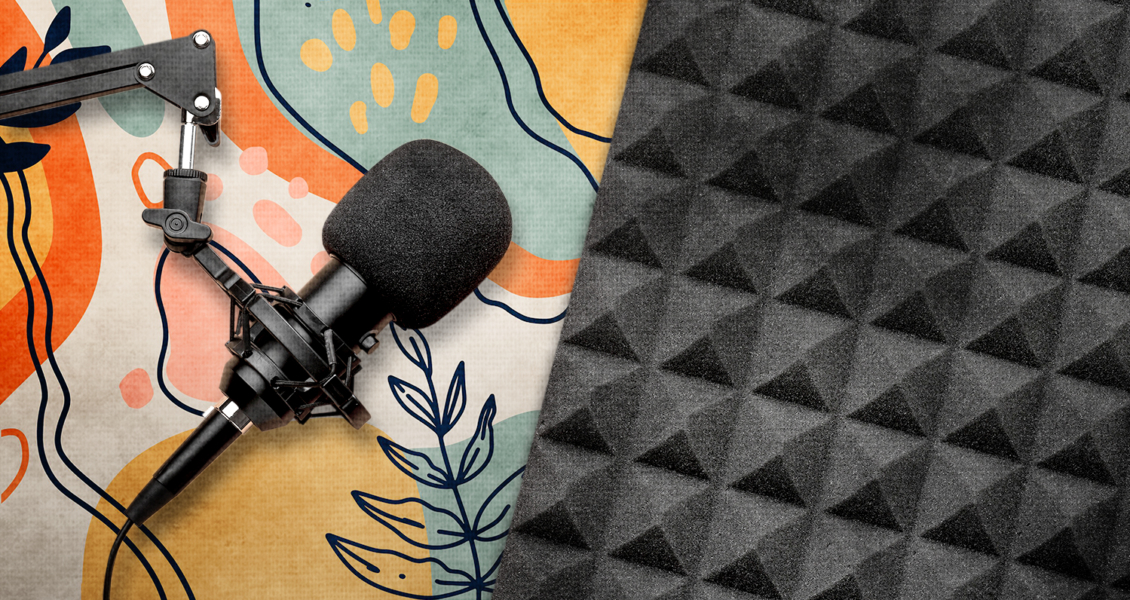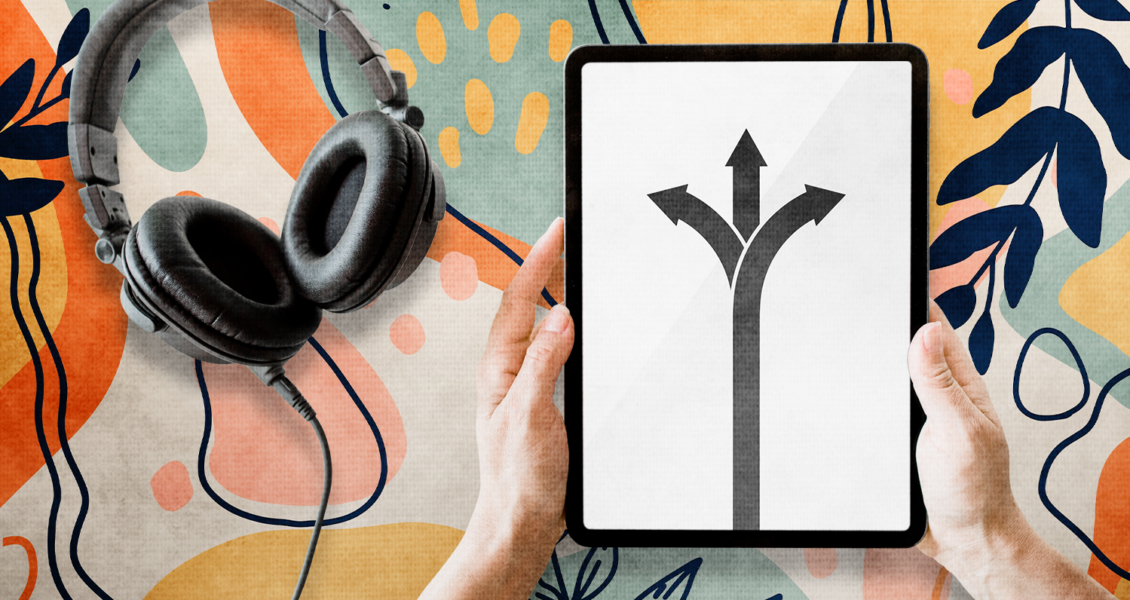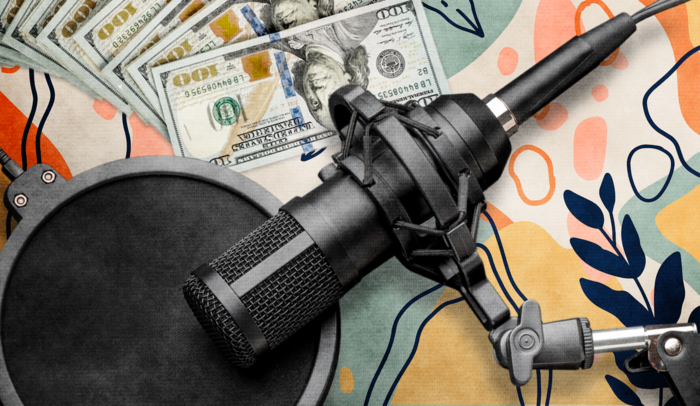If you want to make an audiobook, plan on spending anywhere between $2,500 and $3,750 for a five-hour book. That breaks down to about $500 to $750 per finished hour of audiobook content.
You may wonder whether spending all that money is worth it.
For most Authors, it is. Audiobook sales have grown year over year for a decade straight. In 2020, more than 71,000 audiobooks hit the market. That’s 39 percent higher than the previous year.
Given how many new listeners are flocking to audiobooks, the question isn’t whether you can afford to make a high-quality audiobook. It’s whether you can afford not to.
Below, I’ll break down the different options for recording an audiobook. You’ll learn the most important costs to keep in mind as you move forward.
Options for Recording an Audiobook
Authors have several options for recording an audiobook. All of them come with different price tags, pros, and cons.
Here are your main options:
- Record and Produce the Audiobook Yourself
- Rent Time at a Studio with a Professional Sound Engineer
- Hire a Professional Narrator and Producer
- Hire an all-inclusive Audiobook Creation Service
I’ll explain each of these in more detail below, but keep in mind that each category has price variations.
1. Record and Produce the Audiobook Yourself
Many Authors assume that they’ll save money by recording their own audiobook.
But unless you already know how to turn books into audiobooks, this option may be more trouble than it’s worth. It may also be less cost-effective.
Before you decide to go the DIY route, consider the following:
- What’s your performance ability? Just because you wrote a great book doesn’t mean you’re the best person to narrate the audio version. Professional narrators know how to keep listeners engaged. If you’re not confident you can keep listeners engaged for 5 hours, hire a voice actor who can do your book justice.
- What technical skills do you have? Are you experienced in audio engineering and production? Do you know how to master audio files so they will fall in line with distribution specs? Do you know how to make sure your separate chapter files sound consistent from start to end? If not, then don’t record your own audiobook. Retailers like Amazon or Apple won’t carry a book with low-quality audio.
- What’s your budget? If you already have sound equipment and understand audio technical requirements, recording your own book might be the cheapest option. But for most Authors, the equipment costs and learning curve make this method inefficient.
And remember that the hard work and expense of an audiobook don’t end at production. Publication and distribution will also be on your shoulders if you go with this method.
Equipment Needed
If you’re dead-set on DIY, you’ll need the proper equipment. Here are the essentials:
Audio Recording Software
If you Google “how to make an audiobook,” chances are, you’ll find someone who tells you that all it takes is a few hours on GarageBand.
Do not listen.
Yes, you may already have GarageBand. Yes, it’s relatively easy to use. But it is not designed for the high-quality voiceover work you will need.
Here are some better programs for recording audiobooks:
- Reaper: A discounted license, suitable for most Authors’ needs, costs $60.
- Audacity: This is a free, open-source program.
- StudioOne: The basic version costs $99.95, while the professional version costs $399.95.
- Twisted Wave: After a 30-day demo, a license costs $99.90.
- ProTools: A one-year subscription is $199, or you can subscribe monthly for $34.99.
Computer
Your computer must be new enough to handle whatever software you buy, and it should have enough RAM. I recommend at least 16 GB, but you can get it done with less in a pinch.
Your computer also cannot emit any fan noise. If your computer has a fan, it cannot be in the room where the recording occurs. If you have a sound booth, it should be located outside.
You might need to buy a new computer to ensure the operating system will support your recording software and the plugins you’ll need to use when editing and mastering your audiobook.
You may also need to buy a new computer to ensure your audiobook has excellent sound quality.
Microphone
You will need to choose between two main types of microphones: USB or XLR.
USB mics are good plug-and-play options. They’re much better than the built-in microphone on your computer, but their sound quality is still lower than an XLR mic.
XLR mics are the professional recording standard. They have a standard 3-pin cable that connects to a preamp instead of directly connecting to your computer (more on preamps below). XLR mics produce clearer sounds and offer more flexibility if you want to use your microphone for other purposes, like setting up multiple mics for a podcast interview.
Not all XLR mics are created equal. To make a professional-quality audiobook, you will need to use a large diaphragm condenser mic or a dynamic mic.
Large diaphragm condenser mics are more sensitive and will pick up more sound. They require a phantom power supply, which may be built into your preamp.
Dynamic mics are less sensitive, so they might be a better bet if your recording environment isn’t ideal. But be aware that dynamic mics require a better quality preamp to avoid noise from the higher input gain.
There are microphones at all price points, but you can get a decent USB mic for under $100. Entry-level large diaphragm condenser and dynamic mics will start at a few hundred dollars.
Microphone Stand
To record an audiobook, your microphone stand doesn’t need to be fancy or expensive, but you will need one. Expect this to add around $30 to your overall costs.
Pop Filter
Certain letters like “p,” “t,” or “k,” push air out of your mouth quickly, making a popping noise on your recording. These are known as “plosives.”
Many retailers won’t accept audiobooks with audible pops, so you need to use a pop filter with your microphone.
On the lowest end, a pop filter runs around $10, but they can run into the hundreds on the higher end.
Headphones
You must use headphones when you edit and master your audiobook. It will be almost impossible to pick up on small noises in your audio background even with high-end speakers.
Budget at least $100 for a good set of headphones—preferably studio-quality closed-back headphones.
Soundproofing or a Soundproof Room
Soundproofing isn’t only about keeping sound out. It’s also about stopping sound from bouncing around the room. You don’t want to hear an echo or reverb in the narrator’s voice.

There’s more room noise in a “quiet” room than you will ever notice. And a microphone picks everything up.
You can buy acoustic foam, sound absorption materials, or a soundproof recording box to improve your recording conditions. But truly soundproofing a room is expensive, difficult, and time-consuming.
Audio Interface/Preamp (optional)
Professional recording software will help polish your audiobook’s sound, but you will also need an audio interface/preamp if you want the best quality.
The interface is a piece of hardware that handles the analog to digital conversion of audio and provides important features like sound metering. It also allows you to connect your recording gear to your computer, so if you have an XLR microphone, you will need an interface.
The preamp boosts the signal of your microphone.
The better your equipment, the less noise they’ll introduce into the recording.
Plan on spending $50 to $200 for a “consumer-grade” interface and up to $1,000 if you’re looking for professional quality.
Pros and Cons
The pros of DIYing your audiobook are obvious:
- You’ll have total control over the sound of your book.
- You’ll own equipment that you can use in the future.
- You’ll hone technical skills that might serve you well.
- You might save money if you already own the recording essentials.
But for most Authors, the cons of recording your own audiobook outweigh the benefits:
- You’ll need to buy costly equipment.
- There is a steep learning curve. The time you spend learning new skills isn’t worth it unless you’re planning to use them often.
- If you run into problems, you won’t have any help.
- Unless you know what to listen for, you may miss quality issues in recording and mastering.
- You run the risk of creating an audiobook that sounds unprofessional.
Total Cost
The total cost of the DIY method depends on what equipment you already have and what level of equipment you plan to buy. Assuming you’re starting from scratch, you’re easily looking at $1,000+ before you even hit record.
And, of course, time is money. You must add in the hidden costs of the time you spend setting up the equipment, learning to use it, and actually producing your audiobook, plus the added costs of publishing and distributing your book.
For most people, the so-called “affordable” option is anything but.
2. Rent Time at a Studio with a Professional Sound Engineer
If you really want to narrate your own audiobook, your second option is to rent time at a studio with a professional sound engineer.
You will want to select someone who has direct experience with making audiobooks. Voiceover work is distinct from music mixing, and a good audiobook engineer will be able to record and direct the session, so it sounds as clear as possible.
Renting a music studio can range anywhere from $30 to $200 per hour. In major markets like New York, Los Angeles, and San Francisco, you’re likely looking at around $150 per hour. The cost should be lower outside of those major markets,—perhaps in the $40-$80 range.
Once your audiobook has been recorded, it moves into post-production, where editing, proofing, and mastering take place. Post-production is usually done at a “per finished hour” (PFH) rate that starts around $75 and can rise above $200 per finished hour.
Assuming your book has a word count of 45,000 words, that will translate to about 5 hours of finished audio.
Pros and Cons
Here are the pros of hiring a professional sound engineer:
- A good audiobook producer will make sure that everything sounds good during the recording session. There are some things that can’t be fixed in post-production.
- You won’t waste time or money on software and equipment you aren’t comfortable with.
- You will get to work with people that you’ve vetted and hired.
But there are also some major downsides that many first-time Authors don’t consider:
- Authors who are new to narration generally record at a 3:1 or 4:1 ratio. That means that for every 3-4 hours in the studio, they get 1 hour of usable audio. If your audiobook narration isn’t dialed in, you might end up paying an arm and a leg in studio fees.
- You’ll have to spend time and energy to find the right studio, engineer, editor, etc.
- Double-check your agreements to see what’s included. You don’t want to rent a studio at the top of your budget only to discover that the engineer’s fees are separate.
Total Cost
If you live outside a major market, 15 hours of studio time at $50 per hour would come up to $750. Post-production will add another $375-1,000.
With this option, you can expect to pay a minimum of $1,000 for a finished audiobook. But if you live in a major city, you’re potentially looking at $3,000 in studio costs alone.
3. Hire a Professional Narrator and Producer
Instead of at-home DIY or renting a studio, you can hire multiple people who can record and produce your audiobook.
I’ve already explained what an audio engineer does. Alternatively, you could hire an audiobook producer. Their job is to record the narrator, make sure they’re reading your book correctly, and direct their performance. They’ll also make notes for the audio editor.
Sometimes audiobook producers pull double duty as audiobook narrators. But most Authors will also need to hire a voice actor to bring their book to life. Professional narrators exist for a reason, and a good one is worth the added cost.
If you assemble your own team, you will have several options for paying them. I’ll go over these options below and explain their pros and cons.
Flat Rate and PFH Rates
You might encounter a flat-rate payment if you hired a celebrity to narrate your audiobook. They would negotiate an upfront fee, and it could be upwards of $20,000. These agreements are rare.
Per-finished-hour rates are the more common way to hire audiobook professionals. The Author agrees on a per-finished-hour contractual rate with each collaborator and pays before the book is published.
The industry standard is to pay audiobook narrators PFH rates. Most professional narrators will not work for less than the Screen Actors Guild-American Federation of Television and Radio Artists (SAG-AFTRA) scale pay. At the moment, that’s somewhere just above $200 PFH with an additional percentage that goes to the actor’s pension and health fund (P&H).
If you hire a union narrator, they will likely ask you to pay them through a SAG-AFTRA paymaster. Paymasters are designated companies that work as payroll administrators for SAG-AFTRA. The paymaster will get a fee on top of the total fee you pay to the narrator.
The benefit of a PFH fee is that everyone knows approximately what they’ll be spending or getting paid. Union narrators that get a PFH rate do not get royalties. If your book becomes a bestseller, you will get to keep all the profits.
The primary downside of PFH contracts is that you must have the money ready before you publish your book. The upfront costs can be burdensome if you haven’t budgeted well.
Revenue Sharing
Some audiobook narrators and producers are willing to work according to a royalty share contract. Meaning they will earn a designated percentage of all revenue the book brings in.
For example, let’s say that you go through Amazon’s ACX platform to find your audiobook producer. ACX will pay 40 percent royalties for any audiobook they have the exclusive right to sell. Of that 40 percent, 20 percent goes to the Author, and 20 percent goes to the producer.
This system could potentially benefit an Author who can’t afford the upfront production costs of an audiobook but who expects to sell a good number of copies.
But frankly, I don’t recommend it. Scribe believes that the royalty system actively works against the interests of the Authors because it pushes all the attention onto book sales, not onto the Author’s larger, more meaningful goals.
Hybrid
You might also come across a hybrid option where you agree to pay a reduced PFH rate upfront and a reduced royalty rate.
Again, this can help defray your initial audiobook costs, but it can also undermine your potential earnings and goals.
Pros and Cons
There are some notable benefits to hiring your own team of contractors:
- You get to pick every member of the team. This guarantees your confidence and quality control.
- Your audiobook will sound exactly like you want it to.
- You can negotiate rates with each contractor.
There are also some large downsides:
- It can be time-consuming to assemble a team. To find the right narrator, you’ll have to search, review their portfolio, interview them, hire them, and create a schedule. Then you’ll have to follow that same process to find the right engineer/production team, etc.
- You can negotiate rates with each contractor, but if you aren’t careful, you might end up spending more money than you would hiring a ready-made team.
Total Cost
The cost of this method varies highly. But here are basic examples.
Let’s assume your team wants PFH payment. You’ve agreed to pay your narrator $200 PFH, your audiobook producer $200 PFH, and you’ve booked 10 hours of studio time at a rate of $200. For a finished 5-hour book, you’re looking at $4,000.
If you sell 1,000 books for $10 each, with a 40 percent royalty, you’ll recoup your expenses. Everything you earn afterward will be pure profit.
For a royalty-share book, you have no upfront costs. Again, assuming you sell 1,000 books for $10 each, ACX will pay $4,000. Half of it will go to your audiobook producer and half to you. You’re left with $2,000. Anything you earn in the future will continue to be split.
If you have a hybrid contract, let’s say that you’ve paid $2,000 upfront and have retained 30 percent of the royalties. Your 1,000 books will pay your producer $1,000, and you’ll make $3,000. That leaves you with a $1,000 profit. Anything you earn in the future will continue to be split.
Out of those examples, the royalty-share options might sound the best, but the situation would look completely different if your book became a bestseller or if you only managed to sell 10 copies.
4. Hire an Audiobook Production Service
Your final option is to hire an all-inclusive audiobook production service, where all services are provided for a flat fee.
Scribe Audiobooks is one of the only audiobook production companies that offers services for a flat rate. Scribe Audiobooks is a done-for-you audiobook service that includes everything you need to either be paired with a professional narrator or coached on how to narrate. Then we record, produce, and distribute your book to the world.
Most other production companies charge $500-750 PFH. Some companies follow a done-with-you model. Their job is to coach the writer through the audiobook process, alleviating any stress or questions they may have along the way.
Pros and Cons
There are obvious places where this option wins over DIY and studio rental. For one, your book will sound a lot more professional with a whole team behind it. But it also wins out over the “assemble your team” option for one major reason: time.
Hiring a narrator and a producer on your own is incredibly time-consuming. And they also won’t handle your audiobook publication and distribution.
A turnkey service like Scribe’s will handle all of that for you.
For most Authors, this is the best option. But, it’s also the most expensive. Some Authors won’t be able to afford the turnkey service.
Total Cost
When you’re hiring a done-for-you service, you can expect to pay rates either on par with the “assemble your team” model or slightly higher.
Scribe’s service—which includes preparation, recording, post-production, publication, and distribution—costs $6,000.
Other Costs to Consider
After the audiobook is produced and recorded, there are still more steps to consider. Audiobook publishing and promotion can be time-consuming and expensive steps to undertake on your own.
With a done-for-you service, you won’t have to learn how to promote an audiobook or which audiobook distribution services are best. Your total audiobook price already reflects those costs.
Conclusion
The cost of an audiobook can vary widely, depending on whether you have the skills to do it yourself or if you’re looking for a worry-free finished product.

Every Author must consider their budget, capabilities, and anxiety threshold before choosing their audiobook path.
A done-for-you service like Scribe Audiobooks is your best bet if you can afford it. You’re guaranteed to walk away with a high-quality audiobook professionally produced and ready for the world.


